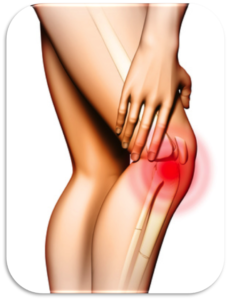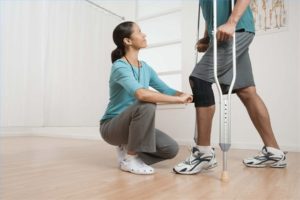Best Defense against Knee Osteoarthritis
February 3, 2020

The knee joints support an individual’s entire body weight as we move around doing our daily chores. In fact, they are subject to intense forces when we run, climb stairs, or perform other strenuous motions.
If you are one of the millions of individuals suffering from osteoarthritis of the knee, you probably know that this condition can severely hinder your ability to perform your normal daily functions.
How does it happen?
It’s estimated that roughly 75% of all people over the age of 60 will experience arthritis in one joint or another, and doctors believe that being very overweight can increase your odds.
In technical terms, osteoarthritis is characterized as “pain, stiffness, limited range of motion, and mechanical irregularities of the affected joint.”
So what does a knee joint with arthritis look like? Picture this: a healthy joint is (from the inside) smooth and wet, with cartilage that easily ‘soaks up’ fluid and nutrients to allow easy movement of the joint with little to no friction.
An osteoarthritic joint, on the other hand, has trouble absorbing the necessary fluids, so it begins to ‘dry out’, leading to cracks on the surface. When this roughened cartilage connects with other cracked, dry cartilage, the result is like sandpaper grinding against sandpaper.
If you believe you have osteoarthritis of the knee, contact your doctor. In addition to a physical examination, the doctor may request x-rays of your knee(s) or test your blood to rule out other forms of arthritis. If you are diagnosed with arthritis, there are steps you can take, with the help of our trusted therapists, to improve your situation.
Are Supplements Right For You?
 There are many supplements that claim to bring relief to arthritis sufferers, but do any of them truly work? Glucosamine, which is derived from shellfish exoskeletons and is believed to have anti-inflammatory properties, was found to be as effective as acetaminophen in reducing osteoarthritis pain in several studies. However, the word on Chondroitin is still out. Before you invest in over the counter supplements, consult your doctor about the likely benefits in your unique situation.
There are many supplements that claim to bring relief to arthritis sufferers, but do any of them truly work? Glucosamine, which is derived from shellfish exoskeletons and is believed to have anti-inflammatory properties, was found to be as effective as acetaminophen in reducing osteoarthritis pain in several studies. However, the word on Chondroitin is still out. Before you invest in over the counter supplements, consult your doctor about the likely benefits in your unique situation.
Exercise Your Way to Healthy Knees

Low-impact exercises within the limits of pain (walking, bicycling and aquatic exercises) are typically best. As exercise and injury prevention specialists, we will evaluate you to determine exactly what frequency, intensity, and duration of exercise (‘core components’) is best for you.
A Word of Caution:
High-impact activities (running and jumping) must be avoided since they place an unnecessary amount of stress on the joints. If you’re unsure about a particular exercise, please discuss it with us.
Your best bet is to participate in low-impact exercises that can help strengthen your muscles and improve your flexibility, with a gradual increase in one of the ‘core components’ mentioned above.
We provide many suggestions for safe, effective exercises that can be performed at home to help you better cope with your osteoarthritis. Call us today to find out what’s best for you. You don’t have to suffer from knee pain. We can help.